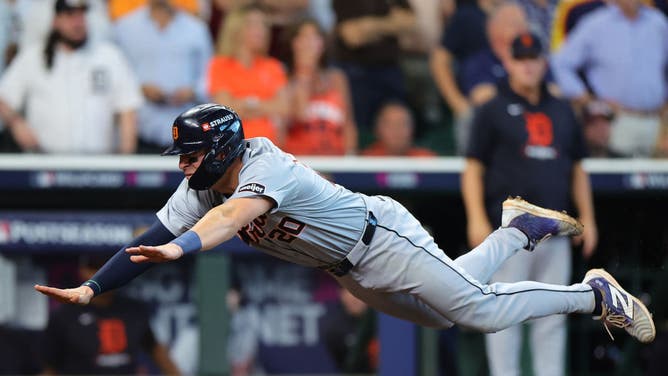Mets, Tigers, Royals Show How Little MLB Postseason Narratives Actually Matter | Ian Miller
Every year, fans across Major League Baseball hear the same postseason narratives, and every year, the outcomes on the field show how inaccurate those narratives are. There's been only one round completed so far, and the 2024 playoffs may already have provided the best possible example of how misleading "conventional wisdom" can be.
One of the most oft-repeated storylines is the importance of home field advantage. Teams can avoid travel, familiarity with the stadium, the importance of supportive fans, and being able to play a winner-take-all at home. Except in the wild card round, the road team went 6-3 and won three of the four series. The only road team to not win a game was the Atlanta Braves, who were decimated by injury and forced to replace likely NL Cy Young winner Chris Sale in game one with just a few hours notice.
The Detroit Tigers and Kansas City Royals entered their series on the road against the heavily favored Astros and Orioles and went 4-0. Those two winning teams allowed four runs in four games…combined.
This isn't a one off either; last year, the entire national baseball media marveled at the crowd noise and intensity at Philadelphia Phillies home games. Citizens Bank Park was too intimidating, they said, making it nearly impossible for a road team to win in such a hostile atmosphere. Meanwhile, the 84-win Arizona Diamondbacks closed out the NLCS by winning two in a row in Philadelphia, outscoring the Phillies in front of their rabid crowd 9-3 in the process.
On the other side of the playoff bracket, the road team in the ALCS between the Rangers and Astros won every single game. Texas went 2-0 in Houston, the Astros went 3-0 in Arlington, and the Rangers won two in a row in Houston to advance to the World Series. The exact same thing happened in the 2019 World Series between the Nationals and Astros. Home field doesn't matter when the gaps between teams are so small.

HOUSTON, TEXAS - OCTOBER 02: Spencer Torkelson #20 of the Detroit Tigers slides home to score a run against the Houston Astros in the eighth inning during Game Two of the Wild Card Series at Minute Maid Park on October 02, 2024 in Houston, Texas. (Photo by Alex Slitz/Getty Images)
MLB Wild Card Round Shows Futility Of Postseason Bullpens
A recent study found that in order to give the better baseball team the same chance of advancing to the next round as the favorite has in the NBA playoffs, MLB would have to schedule a best-of-75 series. That's not happening. But it indicates the futility of trying to find the "secret" to winning playoff baseball games.
The Astros were the better team in their series with the Tigers, yet the difference in winning percentage over 162 games between the two was quite literally one percent. 54% for the Astros to 53% for the Tigers. Those types of infinitesimal gaps are common in postseason matchups. The Dodgers won 60% of their games, the Padres won 57%. The Yankees-Royals and Phillies-Mets have the biggest gaps in the division series round, at a whopping 5% each. Each game is essentially a coin flip.
One heavily promoted philosophy is to build the best possible bullpen, assuming that a dominant, reliable closer is key to finishing out tight, intense, stress-filled playoff games. Arguably, the two best closers in baseball in the past few seasons have been Josh Hader and Devin Williams. Hader, in fact, is making $19 million this season. More than the entire Tigers wild card round roster.
He also surrendered a game-changing three-run double in the eighth inning of game two to utility man Andy Ibanez. Ryan Pressly, another elite high leverage reliever in Houston, was charged with two of those three runs, allowing two hits and a walk in just two-thirds of an inning.
Meanwhile, Williams entered the playoffs with just a 1.25 ERA in 21.2 regular season innings for Milwaukee. It was the third consecutive season he'd posted an ERA under 2, with a 1.93 mark in 2022 and 1.53 in 2023. He's struck out 221 hitters over his last 140.1 innings pitched. The list of his impressive pitching accomplishments is endless.
He also surrendered an effectively series-ending home run to Pete Alonso in the 9th inning of the decisive game three on Thursday night.
Williams had allowed one homer all season, and just seven over his last 140.1 regular season innings. You can't predict baseball.
That's really the point; there is no way to predict who will win the World Series, or win an individual series, because the gaps between teams are too small. There's no one factor that makes a team more or less likely to succeed in October. The Braves and Brewers had two of the best four bullpens in baseball this year, per Fangraphs WAR. They ranked one and two in bullpen WAR in the second half of the season. They're both going home.
The Tigers and Royals, meanwhile, had just the 15th and 16th best bullpens. They're advancing. Welcome to postseason baseball, where nothing matters, and everything is on the line.